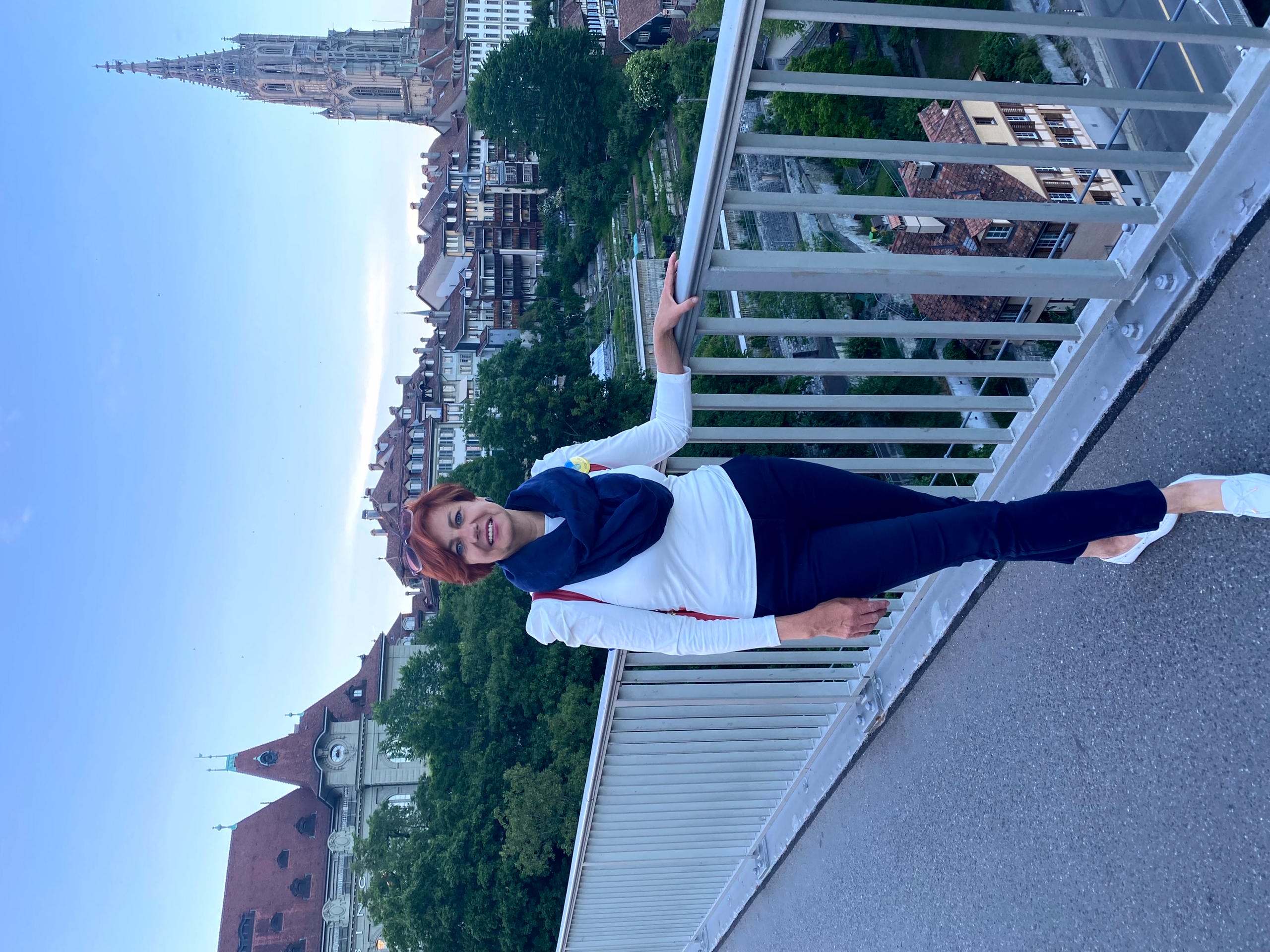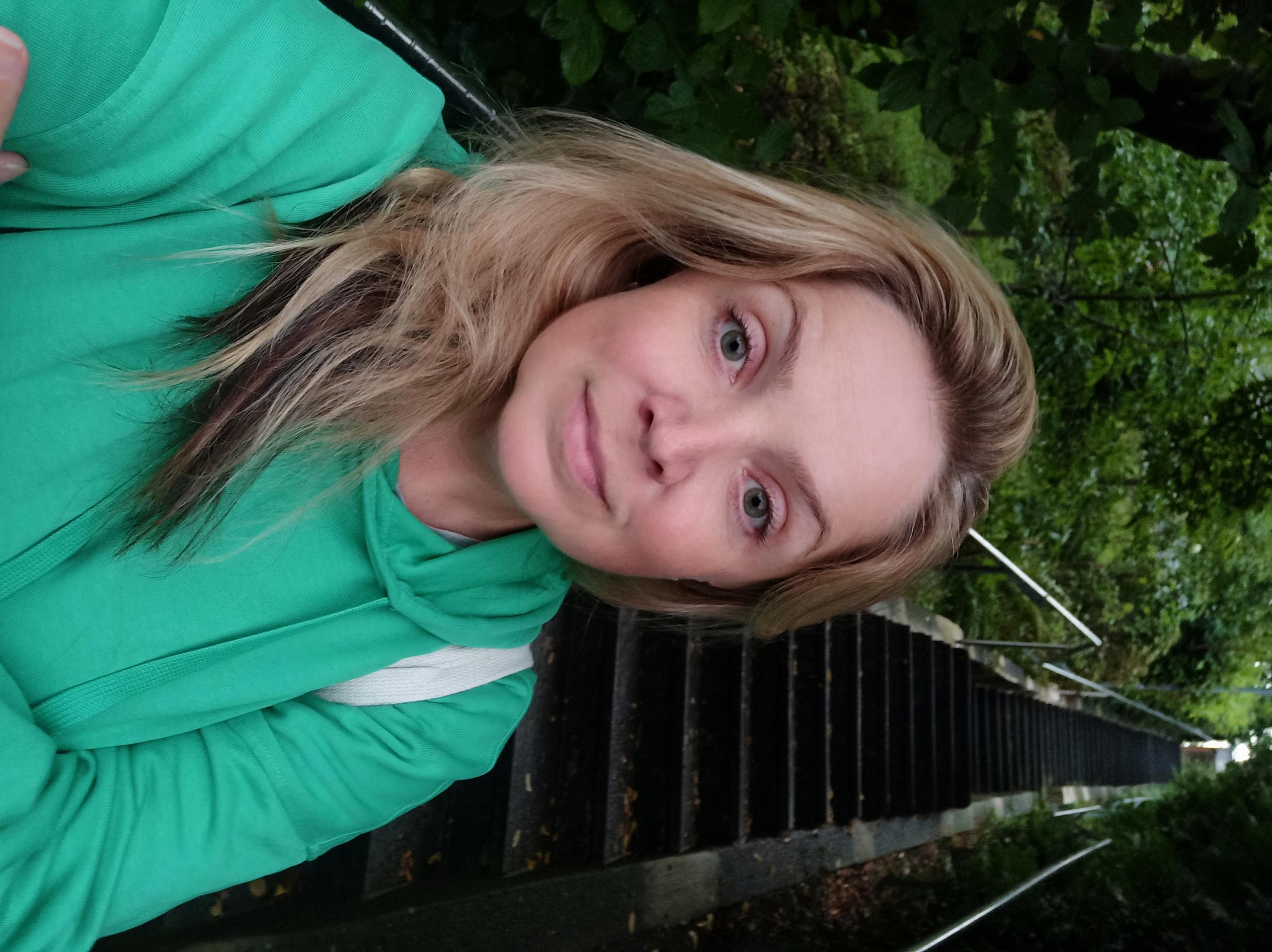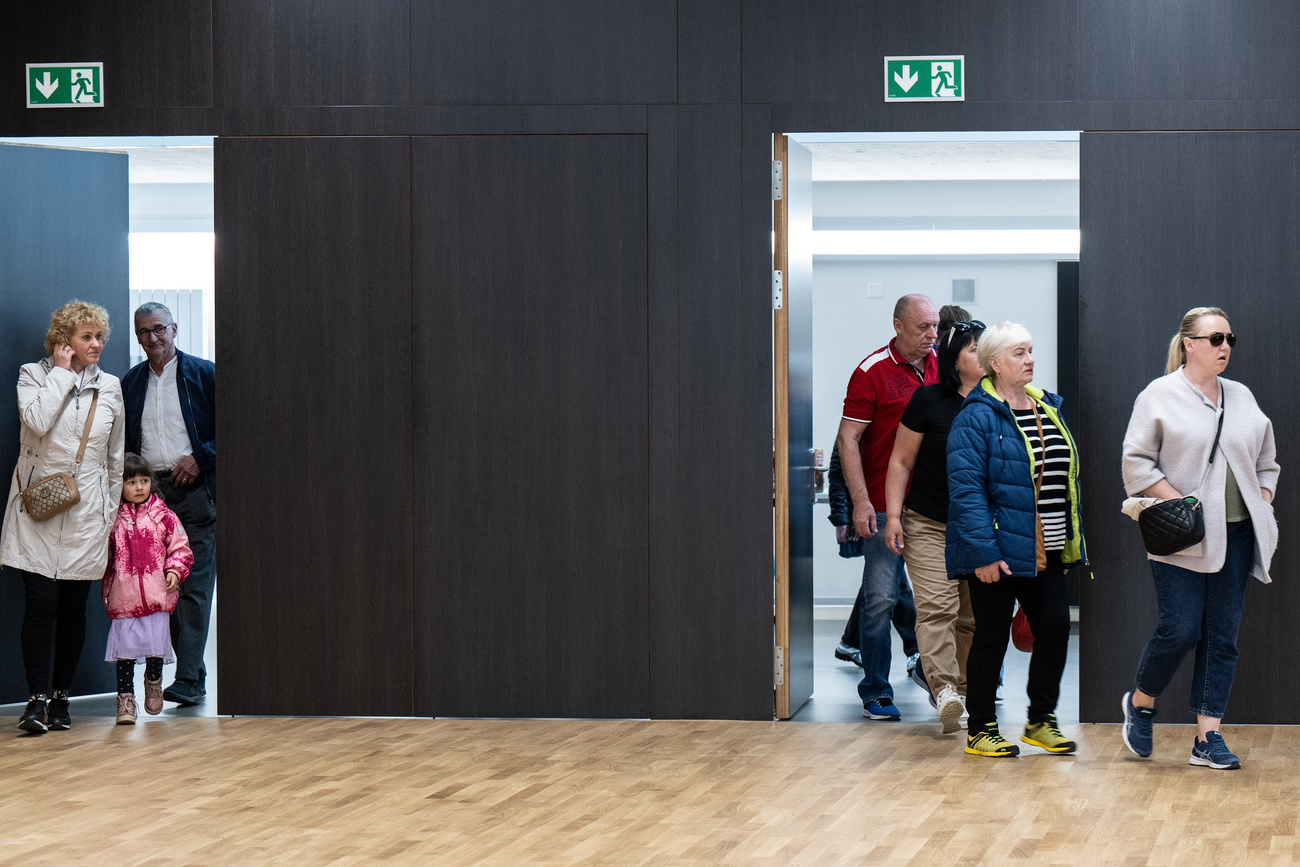
Three Ukrainian women on the challenges of integrating in Switzerland

Just about 20% of the Ukrainians who fled to Switzerland have a job. Why is that, and what do they experience when looking for work? Three women share their experiences.
According to the latest figures from the State Secretariat for Migration, around 66,000 Ukrainians are registered in Switzerland, almost 40,000 of them of working age.
With protection status S, which is a temporary permit, Ukrainian refugees are entitled to holding a job. Their employment rate of 20% is low compared to the Swiss average of 70% – and this despite their relatively good level of education.
What the data does not reveal are the difficulties refugees have to overcome in order to find work.
To learn more about the obstacles they face, SWI swissinfo.ch got in touch with three Ukrainian women living in the Bern region.
Writing reports for the WEF

Larissa Verbitskaya has been working tirelessly as a volunteer since she arrived in Switzerland in March 2022. Even before the Russian invasion, she had helped internally displaced people in Donbass.
Now, a year and a half after her arrival, the 54-year-old from Kharkiv is still in Bern. She has not lost courage and continues to do what she does best, which is project management. In two completed projects, she acted as a mentor and supported other Ukrainian women in their efforts to become self-employed.
In another project, she was part of a team of 25 volunteers who distributed clothes, toys and other items to more than 3,000 Ukrainians.
On August 24, Ukraine’s Independence Day, she launched a new project focusing on integration. Called Haus Ukraine in Bern (Ukrainian House in Bern), it offers a space for bilingual conversation groups, art courses and reading groups for children as well as workshops offering psychological support for older people.
Verbitskaya has a busy schedule. She works around 40 hours a week. She spends around half of her time volunteering and the other half on paid work.
Soon after she arrived in Switzerland, she managed to convince the World Economic Forum in Davos to hire her as an expert for its Equality Lounge. In the first year, she was commissioned to write a report on the gender gap. For this year’s forum, she is writing a report on the situation of Ukrainian migrants.
Her other assignments also have to do with migration issues. Verbitskaya is working for a foundation on an international project called Harmony to Ukraine, which is still in the preparatory phase.
A “fairly hermetic” job market
Thanks to her voluntary work, Verbitskaya has built up an extensive network. But “it’s hard to be a refugee – nobody becomes one by choice,” she says.
“In Switzerland, many Ukrainians have had to start from scratch.”
She felt that way when she started looking for work, an experience that caused her some headaches. “I find the Swiss labour market pretty hermetic,” she says. “Employers prefer to hire Swiss people or locals.”
Verbitskaya makes no secret of her disappointment. She also criticizes the lack of flexibility in recruitment.
This perception is also influenced by false expectations, she says. “I think the Swiss labour market only opens its doors to refugees when it comes to cleaning floors. I can certainly clean, no problem at all. I can also look after elderly people. The problem is that I have other skills – I have experience and abilities in a different area. So I say to Swiss employers: please ask me about my experience.”
A lawyer in the wrong country

Olga Zhuk, 47, also has an academic background. She has two university degrees: one in radiation physics and the other in law.
After the collapse of the Soviet Union, her initial training was of little use to her, but she found a way out as a lawyer. For years, she worked as a legal advisor in her home town of Kharkiv.
Now, however, it is difficult to find similar work “because Switzerland and Ukraine have different legal systems,” she says. So she has decided to move into other professional fields.
Zhuk is currently looking for a job. “It’s not easy to find something,” she says. At the same time, she is aware that not every job is an option. “I don’t want to be a cleaner, because I’ve always worked in an office in front of a computer,” she says.
English is not enough
She is doing everything she can to improve her language skills. “I’ve already had a few job interviews,” she says. “I was told that it would be difficult without a good knowledge of German and French.”
Zhuk has a daughter of 23 and a son of 21. In September last year, she managed to rent a spacious apartment in Ittigen, just outside the capital city, which she shares with a Ukrainian friend and her teenage son.
“It’s a very good apartment, similar to the one I had in Kharkiv,” she says. “I am very grateful that I can live in such comfort. We have bought some furniture and household items. The neighbours are very nice, even if they only speak German. I don’t have much use for English here,” she says, laughing.
For a while, Zhuk considered returning to Ukraine, but the situation there is still difficult. “Electricity prices are very high,” she says. “And the war is still going on and people are losing their jobs.”
Returning is currently out of the question for her. She says she has now got used to life without grenades and artillery fire. “Some of my Ukrainian friends who returned home after fleeing abroad later returned to their host countries,” she says.
Zhuk wants to become financially independent. “I don’t want to be dependent on social welfare,” she says. “If I find a job, I can also pay taxes.”
Operating instructions for ship engines

Darya Kaysina is no longer dependent on social benefits. The young philologist, interpreter and translator found a job at the beginning of June.
Until the end of August 2022, she was still working as an associate professor at her alma mater, the V.N. Karazin Kharkiv National University, where she completed her doctorate in German studies in 2018.
After settling in Switzerland, Kaysina continued to teach remotely, but things became increasingly complicated. In the end, she decided not to renew her contract.
At the same time, she continued her master’s degree in technical communication at the University of Strasbourg, which she had started before the war and successfully completed in January 2023.
“Thanks to the diploma from this university, I found a job,” she says. Kaysina is now working as a technical communications expert at Winterthur Gas & Diesel S.L., formerly a subsidiary of the industrial group Sulzer.
“I am responsible for keeping the technical documentation for marine engines up to date,” she explains. “The company is geared towards foreign markets. To be honest, marine engines are not needed in Switzerland that much,” she jokes.
Legal status remains uncertain
At the age of 28, Kaysina already has three master’s degrees, as she also studied English philology and has a degree in translation and interpreting.
Her job search was intensive but short, lasting only three months.
She too sees the national languages as the biggest hurdle. Immigrants also have to adapt to a different working culture. In Switzerland, it is quite normal not to receive a reply to an application. “This lack of a response unsettles many people because they don’t know whether it’s a yes or a no. That’s why it’s important to be persistent and keep pushing.”
Kaysina now lives with her mother in a rented apartment in the suburbs of Bern.
Her permanent employment contract means she no longer has to go to the social welfare office and she has more security. She is also lucky that her employer allows her to work remotely on a regular basis. To get from Bern to Winterthur, she has to commute more than three hours by train.
“Of course I would like to move to my workplace, but that still requires a few steps,” she says. Moving from one canton to another is not so easy, especially if you live with a family member who is dependent on social welfare. Refugees with protection status S need a permit from the canton where they want to live.
Although she is grateful for the opportunities this status offers her, there is still some unease: “I still have great uncertainty about my legal status,” she says. “I don’t feel comfortable with it, because I’m conscious that the period for which this status is granted is quite short.”
Edited by Marc Leutenegger. Translated from German by Catherine Hickley/gw

More
Ukrainian refugees want more work in Switzerland

In compliance with the JTI standards
More: SWI swissinfo.ch certified by the Journalism Trust Initiative

























You can find an overview of ongoing debates with our journalists here . Please join us!
If you want to start a conversation about a topic raised in this article or want to report factual errors, email us at english@swissinfo.ch.